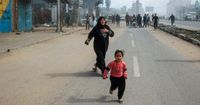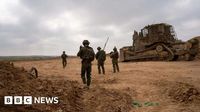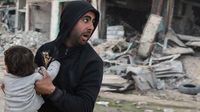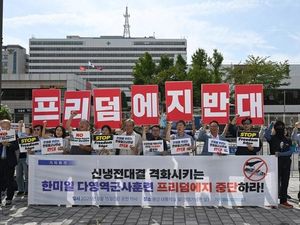In a dramatic escalation of hostilities that shatters weeks of relative calm, Israel has resumed military operations in Gaza, launching intensive airstrikes and ground assaults that have already resulted in substantial casualties. According to reports from Gaza’s health ministry, the latest Israeli campaign has killed hundreds, marking one of the deadliest periods since the truce established in January 2025.
The Israeli Defense Forces (IDF) stated that over the past 24 hours, they initiated targeted ground operations in the central and southern Gaza Strip to expand security measures and create a partial buffer zone between regions of the territory. "Over the past 24 hours, IDF forces have begun targeted ground operations in the central and southern Gaza Strip to expand the security perimeter and create a partial buffer between the north and south of the Strip," the army remarked in a statement.
This military operation follows what many in the region saw as an increasingly fragile peace process, highlighted by recent negotiations that ultimately stalled due to disagreements over hostages held by Hamas. Defense Minister Israel Katz issued a stark warning to Gaza residents: "This is the last warning." His comments underline the urgency with which the Israeli government is maneuvering to pressure Hamas into compliance.
As of March 19, 2025, the death toll in Gaza since October 7, 2023, has surpassed 48,570 deaths, with rising numbers attributed to the renewed conflict. Reports from Gaza’s Civil Defense indicate that at least 436 Palestinians, including many children, were killed in the violence since Israeli forces resumed airstrikes on March 18. "We are on the brink of famine threatening the residents of the Gaza Strip," warned Mahmoud Basal, a spokesperson for Gaza’s Civil Defense, emphasizing the dire humanitarian conditions exacerbated by the conflict.
The international community reacted swiftly to the renewed violence. Foreign ministers from Germany and the European Union expressed deep concern over Israel's actions, with German Foreign Minister Annalena Baerbock stating that the strikes were "shattering the tangible hopes of so many Israelis and Palestinians of an end to suffering on all sides." Similarly, British Foreign Secretary David Lammy demanded an investigation into a deadly incident at a UN compound, where a UN employee was killed amid the airstrikes, stressing the importance of holding those responsible accountable.
Regarding negotiation efforts, Hamas has suggested potential openness to resume talks but firmly rejected Israeli demands for bilateral agreements to renegotiate the truce. Hamas official Taher al-Nunu stated, "Hamas has not closed the door on negotiations but we insist there is no need for new agreements." This statement reflects the ongoing contention about the ceasefire, which has seen tensions persist despite intermittent dialogues.
The situation within Israel has also become increasingly strained. Thousands of demonstrators gathered in Jerusalem, demanding that Prime Minister Benjamin Netanyahu prioritize the recovery of hostages over military operations. One protester, Nehama Krysler, passionately expressed, "We want him to know that the most important issue is to get the hostages back." This sentiment runs counter to Netanyahu’s military agenda that many protesters argue places hostages at greater risk amid the continued bombardment.
The recent wave of violence began on March 17, 2025, when Israeli airstrikes targeted numerous locations across Gaza. In the aftermath, IDF officials detailed that this was only the first phase in a broader military strategy designed to coerce Hamas into compliance with Israeli demands, including the return of hostages. An Israeli official revealed, "The airstrikes in Gaza were the first phase in a series of escalatory military actions aimed at pressuring Hamas into releasing more hostages." Yet with only eight hostages returned since the conflict began, many question the efficacy and morality of this approach.
As the humanitarian situation deteriorates, with reports of hospitals overwhelmed and supplies dwindling, the outlook for civilians in Gaza seems increasingly bleak. Experts stress that the resumption of violence will only lead to further suffering for innocent civilians caught in the conflict. In a heartrending commentary, a senior medical officer at a Red Cross hospital observed the fear palpable among patients: "Now, we can feel the panic in the air... and we can see the pain and devastation in the faces of those we are helping."
The resumption of hostilities has drawn widespread condemnation from various international leaders and humanitarian organizations concerned about the ongoing violations of human rights and the worsening humanitarian crisis unfolding in Gaza. As the fighting continues, the call for renewed efforts towards a ceasefire and a resolution to this enduring conflict grows ever louder.










